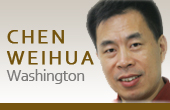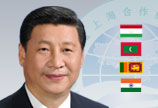Hope for thaw in frosty relations
By CAI HONG in Tokyo (chinadaily.com.cn) Updated: 2014-10-02 18:45Signs that China and Japan are on track to improve ties are on the horizon. A more promising step is that the two foreign ministries are moving in a positive direction.
Their foreign ministers – China's Wang Yi and his Japanese counterpart, Fumio Kishida, held talks in Myanmar in August.
They talked a second time about the problems in the bilateral ties on the sidelines of the UN General Assembly in New York on Sept 25.
In the hope of a turnaround in relations, many people of insight in the two countries said the Xi-Abe meeting is necessary.
But Chinese Foreign Ministry spokeswoman Hua Chunying sidestepped the question at her regular pressing briefing in Beijing on Sept 26 about the possibility of a Xi-Abe meeting.
Serious work should be done to get the bilateral relations out of the stalemate. The bad cold in the diplomatic arena is contagious to the economic relations between the two countries.
Japan's direct investment in China from January to June dropped 48.8 percent from the same period last year to $2.4 billion. This indicates Japanese companies' efforts to make inroads into China have lost steam.
Eizo Kobayashi, chairman of Japan Foreign Trade Council, Inc. and chairman of Itochu Corp. called it a staggering decline.
Still, the number of Japanese tourists visiting China is on a downward trajectory. The Yomiuri Shimbun reported that the number of tours to China that travel agency JTB Corp. sold in the first half of this year is about 30 percent to 50 percent less than that in 2012.
Chinese tourists, however, have a huge rush for Japan. In August alone, 254,000 Chinese tourists visited Japan, an increase by 56 percent over the same month last year, according to the Japan National Tourism Organization.
"Most Chinese visitors have changed their anti-Japan mindset after visiting Japan. Many of them have understood better and trusted more Japanese people. This will pave the foundation for a better relationship between the two countries in the future," said Kiyoyuki Seguchi, a researcher with the Tokyo-based Canon Institute for Global Studies.
Sales of Japanese cars in China have started to recover. Japan's car exports to China between January and June increased by 49.2 percent from the same period, reaching the level seen in the January-June period of 2012.
Shinichi Kitoka, president of the International University of Japan, said that the Japanese prime minister should diligently seek to improve relations with China and South Korea after establishing a solid political footing for approval of the proposed security-related bills in the parliament.
He proposed that the Japanese government establish a national memorial facility for the war dead as a substitute for Yasukuni Shrine.
Both China and South Korea are waiting to see what the Abe administration will do with the thorny issues in Japan's strained relations with them.
South Korean President Park Geun-hye's office confirmed that she had received a written request from Abe for a summit. Park responded on Sept 19 by asking Japan to start with "genuine" efforts to heal wounds arising from its imperialist past.










